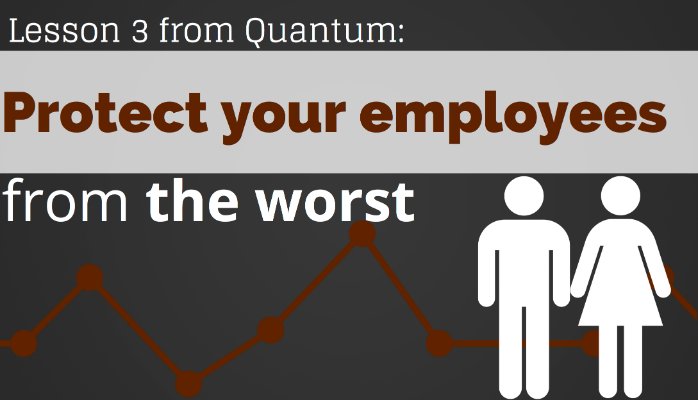This post was first published by Jamie Calvetti on LinkedIn
No one starts a business expecting to fail (glossing over The Producers), but it’s foolish not to prepare for it anyway. Instead of getting cocky and believing you’re too big to fail, it’s a sound business practice to hope for the best but prepare for the worst. And where do you start, exactly? By protecting your employees.
Protecting Their Happiness
Employees are a company’s lifeblood and more and more businesses are catching on to that. In fact, taking care of your employees can help set your company up for more success. Dr. Noelle Nelson found that “companies that effectively appreciate employee value enjoy a return on equity & assets more than triple that experienced by firms that don’t.” Everything from word-of-mouth reputation to productivity can correlate with employee happiness (so even non-customer facing roles like precise steak trimming matter).
What does this matter if you go under anyway? A heck of a lot. Your business may be gone, but you’re not. Protecting employee happiness protects your reputation and loyal relationships.
Basic Needs
Just as happy employees are a basic need for a business, well-being and fair benefits are basic needs for a happy employee. Keeping employees happy doesn’t just mean paying them more than your competitors do. It also means acknowledging their value, keeping promises and showing that you care.
It’s certainly conceivable to go above and beyond the minimum, but there are also ways to under deliver– even within unionized industries like meat processing. One of the broken promises that bite your employees in the butt big time? Underfunded pension liabilities.
What It Means in the Long-Term
We’re focusing on what Quantum Foods’ employees are dealing with right now and will continue dealing with for some time to come.
The obvious issue? A chunk of former employees’ finances are in limbo.
The less obvious one? What it does to the marketplace and, therefore, employment opportunities.
Things like this ripple through the industry. It affects union members’ benefits and other employers’ costs. There’s a flood of financially stressed laborers with few choices for making ends meet in an equally stressed industry. Is this the kind of legacy you want want attached to your name?

